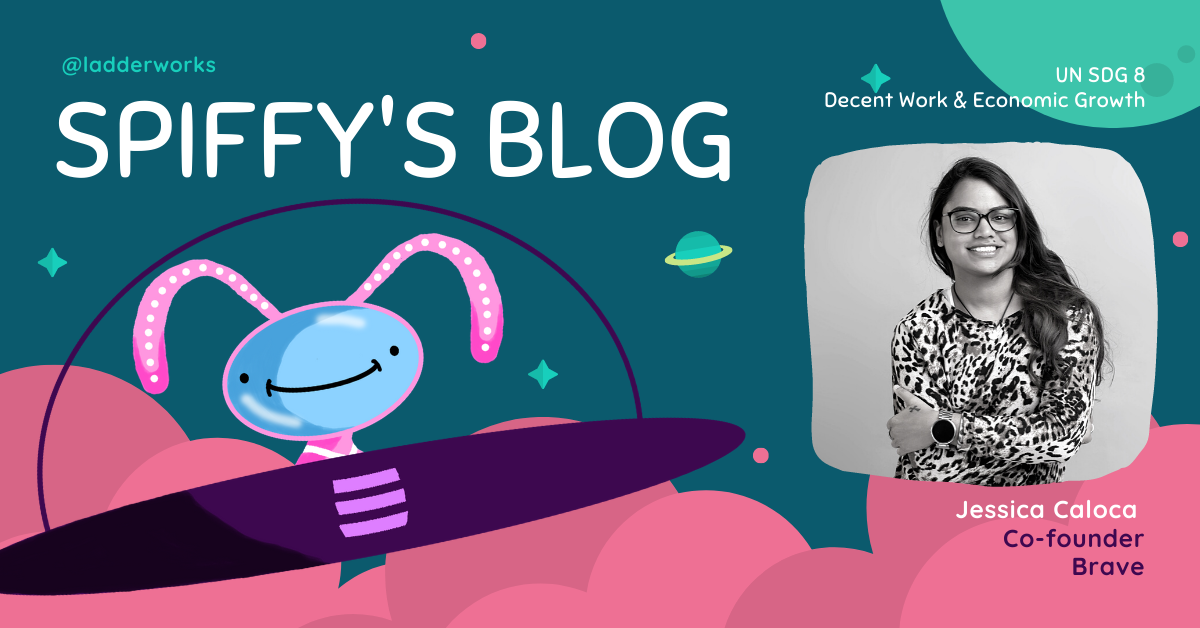Jessica Colaço: Utilizing Virtual Reality to Guide Human Resource Decisions
 Hi folks! I’m Spiffy, your interplanetary journalist reporting from Planet Earth. I’m back with a new guest, a rockstar who is committed to making a difference in the world. All the way from Nairobi, Kenya, please help me welcome Jessica Colaco, co-founder and Vice President of Growth and Success for Brave.
Hi folks! I’m Spiffy, your interplanetary journalist reporting from Planet Earth. I’m back with a new guest, a rockstar who is committed to making a difference in the world. All the way from Nairobi, Kenya, please help me welcome Jessica Colaco, co-founder and Vice President of Growth and Success for Brave.
Spiffy: Hey Jessica, I’m thrilled to talk to you! Tell me, what challenges are you addressing with Brave Venture Lab?
Jessica: Thanks for taking the time to talk to me, Spiffy! Brave helps leaders build winning project teams. It works like fantasy football, but for workforce planning. Managers can essentially bet on the right mix of people needed to successfully complete a project and hit targets. Then, using a comparison dashboard, they optimize their pick(s) against potential risks by adjusting the budget, timeline, and individual characteristics of talent — like skills or motivation.
Spiffy: Wow. This sounds like a real game-changer for human resources. What motivated you to address this?
Jessica: Well, in 2015 I needed to figure out what I wanted to do next. In mid-August, I went to San Francisco for the first time, for a TED fellows retreat and a friend’s wedding. It was my first time in the Bay Area and I wanted to understand that ecosystem. While there, I met my current co-founder, Ibanag Umanah, at a leadership dinner and we had several working sessions about our different ideas. It finally emerged that we were both passionate about unleashing the best in people. That’s how Brave started. We added Daniele Orner-Ginor to the team later in 2016 to give the company a science push. It was like intentional serendipity — a friend introduced me to Ibanga via email in 2015, then we met in person, and Ibanga met Daniele in Europe at another dinner. It was amazing how this all aligned and resulted in Brave, and our mission to unleash the best in people.
Spiffy: That is serendipitous! How would you say Brave is helping to create a more equitable world?
Jessica: You know, Spiffy, most companies don’t know they need workforce optimization. However, as work becomes more distributed and project-based, it’s not good enough to look at one person’s information at a time. Organizations need to consider the outcomes and risks of different combinations of people. Existing HR software helps track projects and applicants. In other words, they organize time and information. We help leaders organize for differing results. For example, which team combinations are best for saving money, improving customer experience, or speed to market? Scenario planning is common practice in finance departments, but until now, it’s been next to impossible in HR.
Spiffy: So you’re really reinventing a way to utilize a common concept. That’s interesting! What about any recent milestones — what can you tell me about that?
Jessica: Well, Spiffy, we have created a prototype version of something really amazing. Imagine there was a virtual version of your company, and every person in the company had an artificial version of themselves. These individual AIs would have their own memories, backgrounds, and professional histories, informing how they acquire skills, work in teams, or take risks. Now, pretend you’re a manager trying to assign people to projects. Our technology generates scenarios for different teams and performance, depending on your objectives, allowing you to use the simulation to select the optimal scenario.
Spiffy: This is phenomenal, Jessica! It sounds like you’re unleashing the best potential for companies too! I want to pivot a bit and ask you about failure. Can you share about an experience when you faced failure and didn't give up?
Jessica: I’ll share about an experience from the music side of things. I was told once that it would be very hard for me to play in a rock band because of my playing style on the bass guitar. A couple of months later, I joined a rock band and we played close to 10 gigs over the course of about a year. It was difficult learning hard rock on bass guitar — it is such a different style. But I persisted and kept practicing every day for at least two hours a day. This shows that anyone can do anything if you put your mind to it!
Spiffy: That’s the truth! Have you learned anything unexpected from someone recently?
Jessica: Everyone has a story, listen to them, observe them and you will decipher it.
Spiffy: Is there anything else you would love to tell our audience?
Jessica: Keep unlearning and relearning in life.
Spiffy: You’ve reminded me to do just that, Jessica! Thanks so much for introducing me to these new ideas. I’m super excited to see where this leads! Best of luck! Over and out!
Jessica Colaço is co-founder and vice president of growth and success at Brave Venture Labs. Jessica co-founded iHub in 2010 — the first tech hub in Nairobi — alongside Erik Hersman. Back in 2007, Jessica hosted a series of mobile boot camps with the likes of Facebook, which garnered her recognition as a TED fellow. She has served as a guest lecturer at Harvard, spoken at the SXSW (South by Southwest) conference, and was one of a handful of Kenyan women selected to meet and talk about the tech ecosystem with Melinda Gates in 2019. Jessica is currently a Harambean Fellow. (Nominated by Harambeans)


